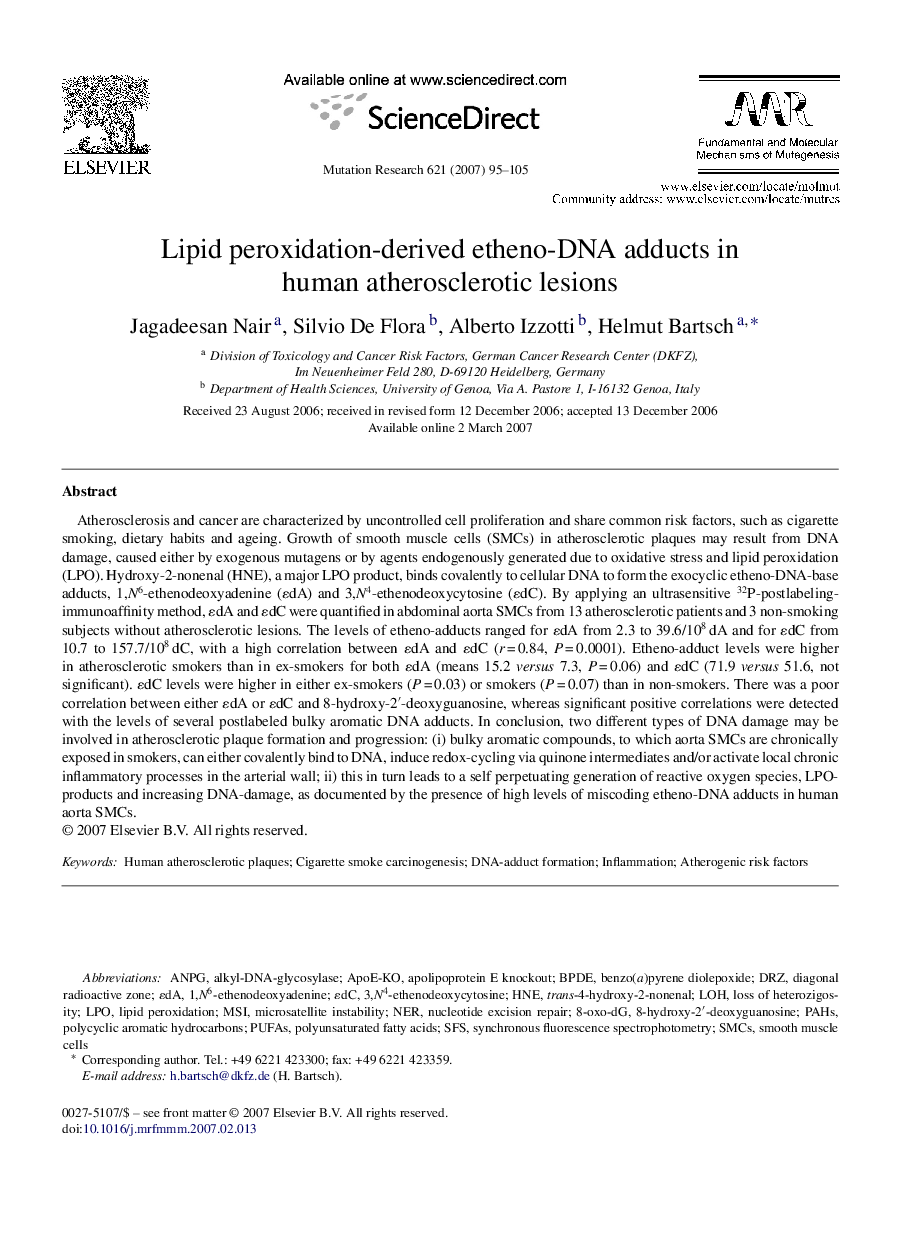| Article ID | Journal | Published Year | Pages | File Type |
|---|---|---|---|---|
| 2147307 | Mutation Research/Fundamental and Molecular Mechanisms of Mutagenesis | 2007 | 11 Pages |
Abstract
Atherosclerosis and cancer are characterized by uncontrolled cell proliferation and share common risk factors, such as cigarette smoking, dietary habits and ageing. Growth of smooth muscle cells (SMCs) in atherosclerotic plaques may result from DNA damage, caused either by exogenous mutagens or by agents endogenously generated due to oxidative stress and lipid peroxidation (LPO). Hydroxy-2-nonenal (HNE), a major LPO product, binds covalently to cellular DNA to form the exocyclic etheno-DNA-base adducts, 1,N6-ethenodeoxyadenine (ÉdA) and 3,N4-ethenodeoxycytosine (ÉdC). By applying an ultrasensitive 32P-postlabeling-immunoaffinity method, ÉdA and ÉdC were quantified in abdominal aorta SMCs from 13 atherosclerotic patients and 3 non-smoking subjects without atherosclerotic lesions. The levels of etheno-adducts ranged for ÉdA from 2.3 to 39.6/108 dA and for ÉdC from 10.7 to 157.7/108 dC, with a high correlation between ÉdA and ÉdC (r = 0.84, P = 0.0001). Etheno-adduct levels were higher in atherosclerotic smokers than in ex-smokers for both ÉdA (means 15.2 versus 7.3, P = 0.06) and ÉdC (71.9 versus 51.6, not significant). ÉdC levels were higher in either ex-smokers (P = 0.03) or smokers (P = 0.07) than in non-smokers. There was a poor correlation between either ÉdA or ÉdC and 8-hydroxy-2â²-deoxyguanosine, whereas significant positive correlations were detected with the levels of several postlabeled bulky aromatic DNA adducts. In conclusion, two different types of DNA damage may be involved in atherosclerotic plaque formation and progression: (i) bulky aromatic compounds, to which aorta SMCs are chronically exposed in smokers, can either covalently bind to DNA, induce redox-cycling via quinone intermediates and/or activate local chronic inflammatory processes in the arterial wall; ii) this in turn leads to a self perpetuating generation of reactive oxygen species, LPO-products and increasing DNA-damage, as documented by the presence of high levels of miscoding etheno-DNA adducts in human aorta SMCs.
Keywords
PUFAsANPGDRZBPDESMCsMSIHNE8-oxo-dGSFsLPO8-hydroxy-2′-deoxyguanosineNERapolipoprotein E knockoutPolyunsaturated fatty acidsinflammationMicrosatellite instabilitytrans-4-Hydroxy-2-nonenalnucleotide excision repairSmooth muscle cellsLOHdiagonal radioactive zonePolycyclic aromatic hydrocarbonsPAHsLipid peroxidation
Related Topics
Life Sciences
Biochemistry, Genetics and Molecular Biology
Cancer Research
Authors
Jagadeesan Nair, Silvio De Flora, Alberto Izzotti, Helmut Bartsch,
